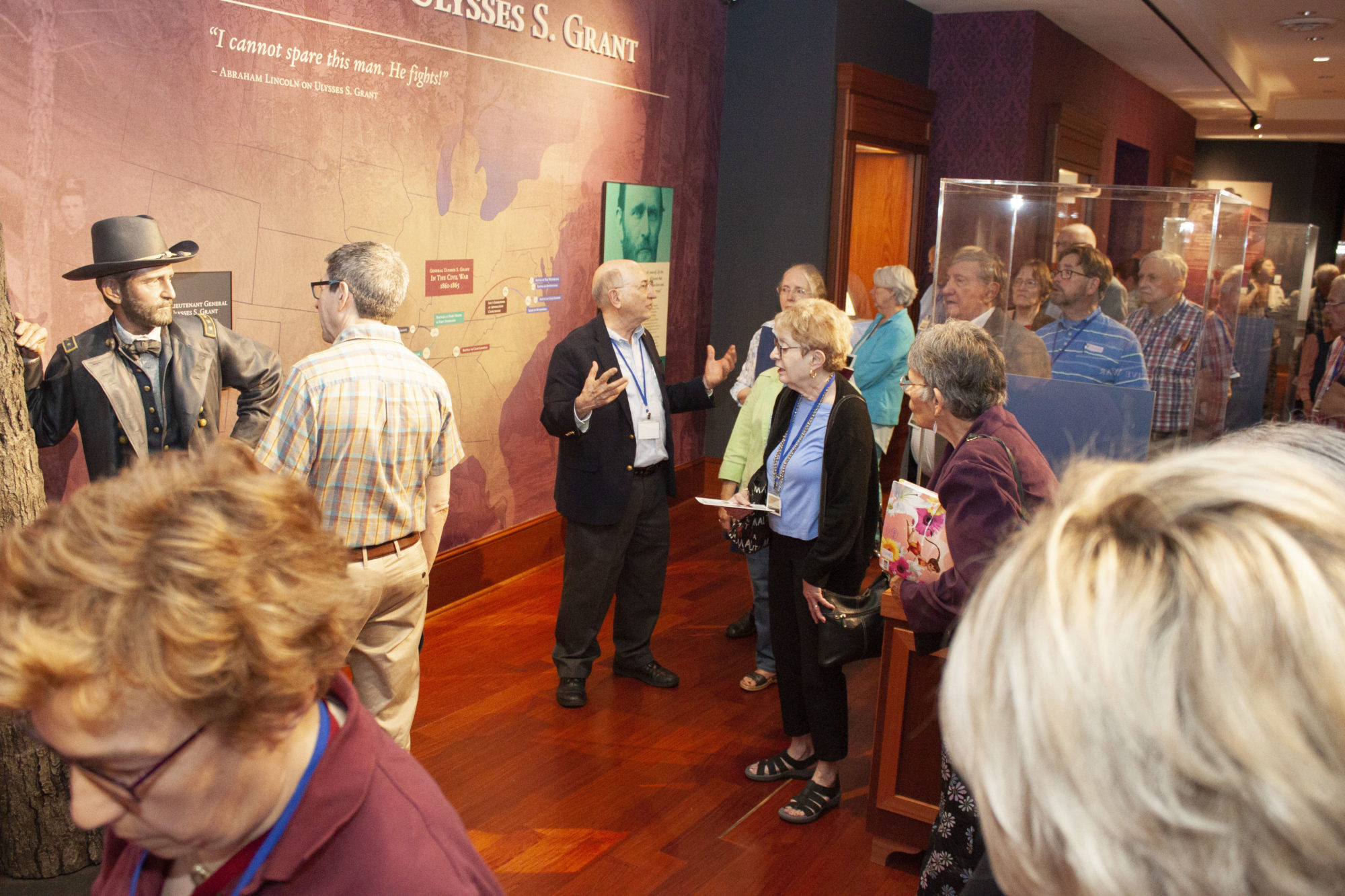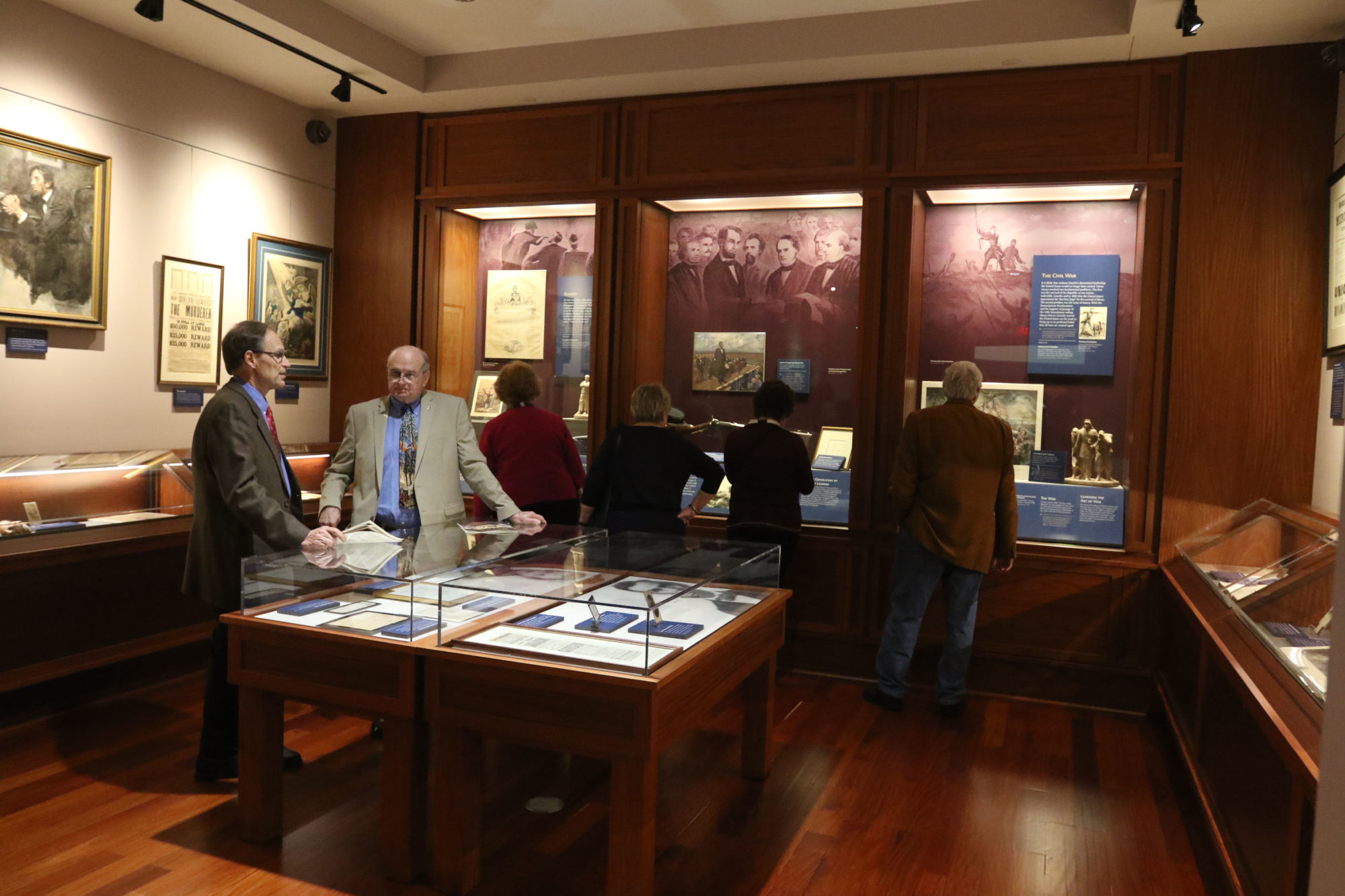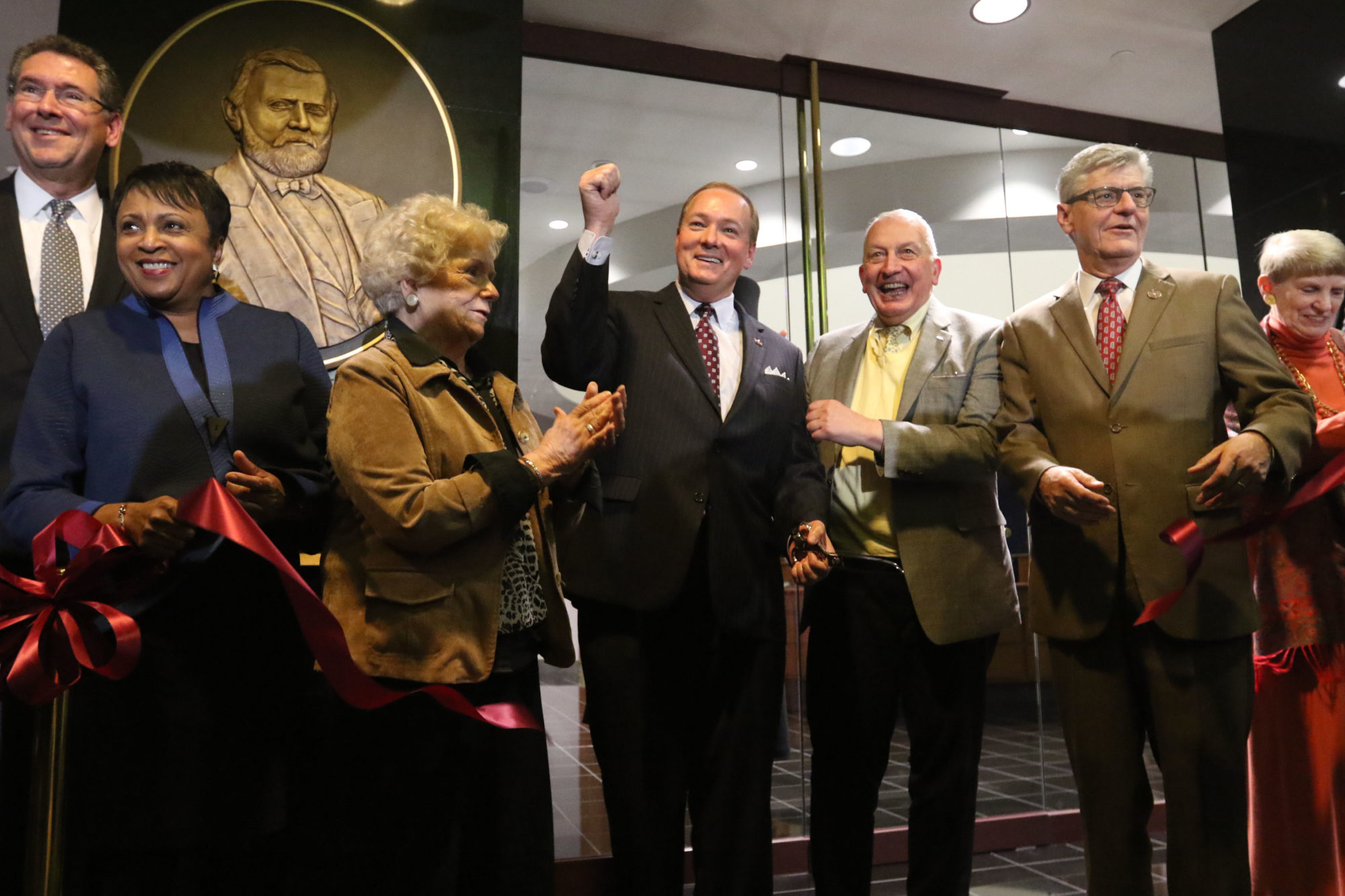An Interview with John Marszalek
An Interview with John Marszalek, Executive Director of the Ulysses S. Grant Presidential Library at Mississippi State University
Sara Gabbard

Sara Gabbard: Please trace the provenance of the Grant Papers before they arrived at Mississippi State University.
John Marszalek: One of the great days in the history of Mississippi State University took place in December 2008. It was just before the university closed for the Christmas break that two full sized moving vans arrived on Hardy Road, and the vast Ulysses S. Grant Collection was off-loaded into an empty room in the Mitchell Memorial Library.
The provenance of these papers and artifacts goes back to the Grant family preservation of the general’s/ president’s letters from his time at the United States Military Academy at West Point. When Grant arrived at the school in 1839 and then graduated in 1843, he had written numerous letters, and his family and the Academy had begun to preserve those manuscripts.
For the rest of his life, Grant’s letters were preserved. This took place: while he was an officer in the Mexican War; when he married Julia Dent of St. Louis, Missouri; during his service in the U. S. Army; after the birth and growth of his children;, and when his business career failed. The greatest preservation took place: when he rose to overall army command in the Civil War; when he was elected to the United States presidency (1869- 1877); during his world tour; when he was fleeced by a so-called “Wizard of Wall Street;” and when he was suffering from throat cancer and wrote America’s greatest piece of non-fiction, his memoirs. Throughout his life, Grant grew to be, next to Abraham Lincoln, the greatest American historical figure of the 19th century.
At first, Grant’s manuscripts and artifacts remained mostly in the hands of his descendants. Some of the artifacts he had accrued over the years also went to the Smithsonian Institution. In the 20th century much material went to the Library of Congress, by gift of his grandson, Ulysses S. Grant III.
In the middle of the Civil War Centennial, a number of his descendants, some of the leading historians of that era (Bruce Catton, Allan Nevins, John Hope Franklin, Ralph Newman) along with the Civil War Commissions of states where Grant had lived (Illinois, Ohio, and New York) formed the Ulysses S. Grant Association. (USGA) Their aim was to honor Grant in a special way by collecting and publishing his writings.
The USGA established itself at the Ohio Historical Society, on the campus of Ohio State University. The driving force was a young Harvard graduate student, John Y. Simon, aided by his talented wife Harriet Furst Simon. Simon taught while he completed his doctorate and gathered Grant material from all over the nation. In 1964, Southern Illinois University became the new home of the USGA, and Simon joined the History faculty there. In 1967, Volume 1 of The Papers of Ulysses S. Grant, published by Southern Illinois University Press, appeared. From that year to 2009, the USGA published 31 volumes, and John Y. Simon became famous as one of the nation’s leading documentary editors.
Unfortunately, Professor Simon died in the summer of 2008, at a time when the Grant Association had already begun action to move its collection somewhere else. Under the leadership of Rhode Island Chief Justice and USGA president Frank J. Williams, the Dean of the Mississippi State University Libraries, Frances Coleman, interim presidents Vance Watson and Roy Ruby and MSU President Mark E. Keenum, the Grant papers were moved to MSU. The appointment to be Executive Director of long-time History professor John F. Marszalek, and the continuation of the many years of financial support from the National Historical Publications and Records Commission (NHPRC) and the National
Endowment for the Humanities (NEH) created the conditions for the move to Mississippi. Under Marszalek, the USGA board of directors and its officers, the MSU administration and an outstanding staff (Aaron Crawford, Robert Karachuk, Amanda Carlock, Elizabeth Coggins, Meg Henderson, Rebecca Houston, David Nolen, Louie Gallo, Ryan Semmes, Rebecca Houston, and Eddie Rangel), Volume 32 was published. Also an award-winning complete annotated edition of the Grant memoirs came out, and a short edition of Grant’s life entitled Hold on with a Bulldog Grip was published.
In 2012, the USGA created the Grant Presidential Library, and in 2017, thanks to President Mark Keenum and the Mississippi legislature, a bond issue was passed and a 21,000 square foot facility was established atop the MSU Mitchell Memorial Library for the Grant material and that of the Frank J. and Virginia Williams Abraham Lincoln Collection.
The cooperation between MSU and the USGA has resulted in a presidential library which contains the greatest collection of Grant material in the world. It has helped stimulate a fresh look at US Grant by historians such as Ron Chernow, Ron White, Joan Waugh, and Charles Calhoun. The legacy of U.S.Grant, whose victory at Vicksburg, Mississippi, made him into a household name, is today housed in that state and has become a venue for recent outstanding studies.
SG: What were the steps taken to prepare for the Library? How long did it take? When was the site opened to the public?
JM: The move from Southern Illinois University required legal action to make sure that all was done properly. The administration of SIU was helpful, and the issue was finalized when MSU President Mark Keenum and the USGA signed a legal agreement. The Executive Director, Library staff members from both institutions, two attorneys representing both MSU and SIU, worked together to make the move possible.
Meanwhile, the Mitchell Memorial Library at MSU prepared an area on the first floor of the building which served as a temporary location for the Grant material. This roughly 1200 square foot space served USGA until the opening of the newly constructed 4th floor facility in October, 2017.
Four years before the grand opening, librarians and staff members worked together to plan the new facility. An architect was hired and so were professional museum planners, an interactive television company, makers of four life size Grant statues, and a company that put finishing touches on the project. The result is a state-of-the-art museum, with a cold storage area, a preparation room for additional collections, staff offices, a reading room for research visitors, a gallery on Grant and another one on Lincoln, an orientation room with a ten minute film, and a welcoming area where volunteer docents greet visitors.

SG: Are some of your materials available to researchers online? If so, please give contact information.
JM: One of the important things that the newly arrived USGA did, with the aid of the Mitchell Memorial Library, was to digitize the 32 volumes of the Grant Papers. It also digitized the old and new USGA newsletters. Significantly, USGA utilized talented undergraduates and graduate students to make available Grant material which had not been placed in the 32 volumes.
The address to access this material is: www.usgrantlibrary.org
SG: Do you present public lectures, events, etc. Please elaborate.
JM: Yes, we do present public lectures and events. One of the tragedies we have encountered in our time at MSU was the sudden death of one of our editors and an outstanding Civil War historian, Dr. Michael B. Ballard. His widow Jan generously asked mourners to establish a speaker’s fund in Mike’s honor. We had over 100 people attend our first lecture by Dr. Curt Fields, one of the nation’s leading Grant reenactors. (He and George Buss, a Lincoln reenactor attended our grand Library opening in 2017). Frank J. and Virginia Williams sponsor an annual fall lecture, bringing to campus leading Lincoln scholars. We also have been fortunate to receive financial support from the local Golden Triangle Civil War Roundtable. We have also established a corps of volunteer docents to help us with our many school, university, and public tours. In these years, visitors from forty-eight of the fifty states have visited our facility, and we have had people from all over the world come for research and viewing. In our first year in the new museum, we had approximately 10,000 visitors.
SG: I am fascinated by the publication of Hold on with a Bulldog Grip. Please tell our readers how this book is being used.
JM: The book Hold on With a Bulldog Grip, A Short Study of Ulysses S. Grant was published in April 2019 by the University Press of Mississippi. It is the 2019-2020 Maroon Edition, which means that it is given gratis to every incoming freshman and transfer student. (Last year John Grisham was the author of the Maroon Edition book.)
The idea for this year’s Maroon Edition came from MSU President Mark Keenum. He is a Civil War enthusiast and found, through his research, that the family of the first president of MSU, Confederate General Stephen D. Lee, and the family of Ulysses S. Grant knew and liked each other. As he put it, making this short book on Grant the Maroon Edition for the year will encourage students to realize the connection between MSU and US Grant. Hopefully students will read this 120 page book and then visit the Grant Presidential Library to learn more.
Each student receives a gratis book during orientation and then at the semester’s first convocation there begins the year-long process of interacting with other students and faculty about this book, staging contests, and other academic events related to the book. During the academic year, 2019- 2020, MSU will incorporate the book into classes, bring in speakers related to the book, and conduct discussions about the book. The Office of the President will plan most of these events.
This publication is available to anyone at a reasonable price at most local book stores and from amazon.com.
SG: I noticed that the 2019 Annual Meeting of the Ulysses S. Grant Association was held at West Point. Please describe the agenda. Also, please give our readers contact information for your Association.
JM: Yes, the USGA had its annual meeting this year, at West Point, to see where Grant was a cadet and, primarily, to attend the unveiling of his new statue on the West Point Plain. The meeting proved exciting.
Our agenda included: numerous dinners at the Thayer Hotel and the Bear Mountain Inn, as well as tours of the West Point campus. We heard from our vice president, Jim Bultema, a leading expert on Grant photography. Elizabeth Samet of the West Point English Department and the editor of a literary edition of the Grant memoirs lectured on her book, and there was an excellent tour of the house and grounds of the Grant Cottage, led by the marvelous Grant Friends organization. The annual John Y. Simon Award was presented to Grant descendant Claire Ruestow Telecki. Finally, our group attended the birthday celebration for Grant at Grant’s Tomb in Manhattan.
The 75 attendees had a wonderful time and got to see things they never would have otherwise.
We are always happy to have new members join our organization. At this time we have over 300 members. Famous Grant scholars like Ron Chernow, Ron White, Joan Waugh, and Charles Calhoun regularly come to our meetings and all, at other times, have spoken to us. Four descendants are members of our Board of Directors and others are regular members.
One does not have to be a scholar or a descendant to belong, however. We welcome anyone who is interested in learning more about U.S. Grant. USGA is a friendly group, and we share the excitement of learning.
Anyone who is interested in joining has only to express that interest to the Executive Director or his assistant, Eddie Rangel at the Ulysses S. Grant Presidential Library, Mississippi State, MS 39762, 662-325-4552. Lifetime membership is $500; yearly membership is $100 and after five straight years of membership, one becomes a lifetime member. Student membership is $25 a year. Membership includes a special rate for registration at the annual meeting and a quarterly gratis newsletter. Our staff here at “headquarters” is always ready to help any of our members in any way we can.
One can also join USGA on-line. Go to www.USGrantLibrary.org.
And do click on that website for all kinds of other information on USGA and the U.S. Grant Presidential Library.

SG: We previously carried an article about the Frank and Virginia Williams Collection at your institution. How are students and scholars using this valuable information?
JM: As mentioned earlier, Frank J. Williams and his wife Virginia have donated their marvelous Lincolniana Collection to Mississippi State University. It is housed in the Lincoln Gallery, and is part of the Ulysses S. Grant Presidential Library. When visitors or scholars or the general public visit our Library, they tour both Grant and Lincoln. The thrill on their faces when they see the desk that was once in an Illinois county courthouse and used by Lincoln or the opportunity to view original Grant material or an interactive Grant television program, cannot be overemphasized. The Williams collection also includes one of the best collections of journals and books on the Civil War, so any visitor can not only see marvelous Grant and Lincoln artifacts, but he/she can also get an insight into both men not available in most places.
We like to say, and we believe that we are accurate, that no one can truly understand these two men or write books or articles about them unless they come to Mississippi State University and consult our marvelous material. Please do visit us and experience our treasures.
John Marszalek serves as Executive Director of the U.S. Grant Presidential Library at Mississippi State University.
